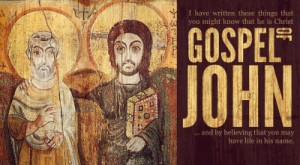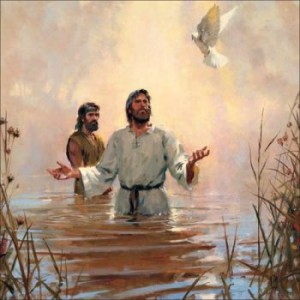Pastor Bob Preaches The Word (or does he?)
By Steve Ray

After ordering grilled salmon, Josh got right to the point. “Sis, I am dismayed that you have abandoned the Bible to follow Rome. Last Sunday Pastor Bob preached about Baptism right straight from the Word of God. I wish you could have heard him.” Jennifer smiled. Josh continued, “He showed how the Catholic Church ignores the Word of God.”
Josh pulled out his black leather Bible. “Baptism does not save you, Sis. Look at this verse.” After quite a few verses he turned to Genesis 15:6 which said that ‘Abraham believed God and it was credited to him as righteousness’. “Where do you see anything about Baptism?” After listening patiently for a while Jennifer interrupted the litany of out-of-context proof texts with a sisterly word of advice.

“Remember Josh, even in Hebrews, when quoting the Old Testament the writer says that “one has testified somewhere, saying” (e.g., Heb 2:6) because there was no easy way of refer to the passage. The Old Testament Scriptures were written on huge scrolls that had to be unrolled-just straight text with no divisions. The New Testament writings were handwritten on papyrus or parchment. For more than 1500 years verse divisions, which we take for granted, did not exist.”
“Come on Sis, what does that have to do with Baptism? Verse numbers make it easier to use the Bible. I just gave you a lot of verses that prove my view of baptism, and you give me a history lesson.”
Jennifer smiled, “My point exactly Josh! Chapter and verse divisions have made it easier to abuse the Bible since people too often view the Bible as a collection of “sayings” divided numerically into bite-sized sound bits. You are a good example-just look at your list of proof-texts about Baptism. You treat the Bible as though it were a collection of unrelated, numerically arranged sentences to pluck out at will. The Bible is actually made up of whole writings to be read in context. Remember that ‘A text without a context is a pretext’. “
“Sis, let’s get back to Baptism. How can you believe that Baptism is necessary for salvation when the Bible says we are saved by faith alone? Read John 3:16 and you’ll see that ‘whosoever believes in Him should not perish but have everlasting life.’ Do you see anything about baptism in that verse? Only faith!”
“You’re right Josh, you cannot find the word “Baptism” in that particular verse. But are you willing to set aside the practice of “proof-texting” and look at the whole context? You don’t start reading Gone with the Wind in the middle of the book and then skip around willy-nilly reading individual paragraphs do you? Of course not! Then why misuse the Bible that way. Let’s stop for a minute and look at the whole picture-what is St. John saying in context?”

Josh agreed and they sat for almost an hour reading the text of St. John and comparing it with the other New Testament writings. Fortunately for us, they took good notes which we are able to pass on to you. Let’s see what they discussed.
********************************************
Biblical Context:
John 3: What does one have to do to avoid perishing and gain eternal life (Jn 3:16)? How are faith and sacraments both necessary, not mutually exclusive (CCC 161; 1236)? How does one become a child of God (Jn 1:12-13)? How does Jesus explain birth from God to Nicodemus (Jn 3:3)? What must take place for one to “see the kingdom of God” (Jn 3:3)? How does Nicodemus misunderstand Jesus (Jn 3:4)? In order to be “born from above”, what two elements are necessary (Jn 3:5; CCC 720; 1215)? Does Jesus describe “faith alone” as the means of New Birth (Jn 3:5)? How does the Catholic Church continue Jesus’ teaching (CCC 1238; 1257)?

The New Testament: How does Peter conclude the first Gospel message (Acts 2:38)? Does he mention “water” and “Spirit”. What did Ananias tell Paul to do after Jesus confronted Paul-when were his sins washed away (Acts 22:16)? How does Paul later describe this experience of “water and Spirit” (Titus 3:5; CCC 1215)? According to Peter, what saves us now (1 Peter 3:21; CCC 1219)? What does Mark say (Mk 15:16)? How would the Jews have understood the Prophets on this matter (Ez 36:25-27)? Is context important (CCC 109-114)?
For more on this, see my article “Are You Born Again?”
********************************************
Context from History and the Fathers and even Martin Luther
Historical Note on Chapter Divisions: Archbishop Stephen Langton (d. 1228). Verse divisions: Robert Stephens in 1551. First Bible with chapter and verse divisions: 1555 edition of the Latin Vulgate.
Tertullian (c. 160-c. 225)
“Happy is our sacrament of water, in that, by washing away the sins of our early blindness, we are set free and admitted into eternal life” (On Baptism).
Tertullian (c. 160-c. 225)
“Now this heresy of yours does not receive certain Scriptures; and whichever of them it does receive, it perverts by means of additions and diminutions, for the accomplishment of it own purpose; and such as it does receive, it receives not in their entirety; but even when it does receive any up to a certain point as entire, it nevertheless perverts even these by the contrivance of diverse interpretations. Truth is just as much opposed by an adulteration of its meaning as it is by a corruption of its text” (Prescription against Heretics, 17).

“They are brought by us where there is water, and are regenerated in the same manner in which we were ourselves regenerated. For, in the name of God, the Father . . . and of our Savior Jesus Christ, and of the Holy Spirit, they then receive the washing with water. For Christ also said, ‘Except ye be born again, ye shall not enter into the kingdom of heaven’. . . . And for this [rite] we have learned from the apostles” (First Apology).
Origen (c. 185-254)
“Let us remember the sins of which we have been guilty, and that it is not possible to receive forgiveness of sins without baptism.”
Origen
“The Church received from the Apostles the tradition [custom] of giving Baptism even to infants. For the Apostles, to whom were committed the secrets of divine mysteries, knew that there is in everyone the innate stains of sin, which must be washed away through water and the Spirit.
St. Augustine (354-430)
“Who is so wicked as to want to exclude infants from the kingdom of heaven by prohibiting their being baptized and born again in Christ?” (On Original Sin).
Martin Luther
“This fountain might well and properly be understood as referring to Baptism, in which the Spirit is given and all sins are washed away” (Luther’s Works, ed. Jaroslav Pelikan [St Louis: Concordia, 1973], 20:331).
Martin Luther
“If the world last long it will be again necessary, on account of the different interpretations of Scripture which now exist, that to preserve the unity of the faith we should receive the Councils and decrees [of the Catholic Church] and fly to them for refuge” (Letter to Zwingli).
Catechism of the Catholic Church
“In order to discover the sacred authors’ intention , the reader must take into account the conditions of their time and culture, the literary genres in use at that time, and the modes of feeling, speaking and narrating then current· Be especially attentive ‘to the content and unity of the whole Scripture.’ Different as the books which comprise it may be, Scripture is a unity by reason of the unity of God’s plan·” (110, 112).



This Post Has 5 Comments
Outstanding work. Thanks for the extra “ammo”. The Bible is overwhelmingly filled with verses that confirm the Catholic teaching of baptism. We also know that our mission doesn’t finish simply there but that we must persevere until the end by staying obedient. I also like showing the difference between John the Baptist’ baptism which was by water only vs Jesus’ which used water and spirit.
Paul refers to “baptism” in Ephesians 4:5. Does it refer to water baptism?
In John 3:16
????? ??? ???????? ? ???? ??? ??????, ???? ??? ???? ??? ???????? ??????, ??? ??? ? ???????? ??? ????? ?? ???????? ???’ ??? ???? ???????.
for indeed God did love the cosmos therefore He did give the only begotten Son, so that all the faithful to Him might not perish but have eternal life
??????? => from ??????, faith => to do faith, ? ???????? => those who be doing faith, i.e. the faithful
They wouldn’t be faithful if they weren’t baptized.
You don’t support UTF on this blog. so all the Greek appears as ?
so transliterate Jn 3:16 from Greek
Houtws gar EgapEsen ho Theos ton cosmon hwste ton Huion ton monogenE edwken hina pas ho pisteuwn eis auton mE apolEtai all’ eche zwEn aiwnion
translates as
for indeed God did love the cosmos, therefore He did give the only begotten Son, so that all the faithful to Him might not perish but have eternal life
pisteuw from pistis – faith => thus doing faith, passive being faithful
ho pisteuwn – the faithful
They wouldn’t be faithful if they weren’t baptized.
It doesn’t seem as complicated to me. At risk of falling into the dangers of citing chapter and verse when Jesus said to the apostles “Whoever believes and is baptized will be saved; whoever does not believe will be condemned.” Mark 16;16
Am I am misinterpreting this verse or taking it our of context?
Comments are closed.